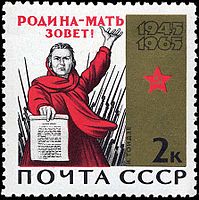Personification of Russia
 From Wikipedia the free encyclopedia
From Wikipedia the free encyclopedia

The personification of Russia is traditionally feminine and most commonly maternal since the Middle Ages.[1] Most common terms for national personification of Russia are:
- Mother Russia
Russian: Ма́тушка Росси́я, romanized: Matushka Rossiya (dim.); also
Russian: Мать-Росси́я, romanized: Mat'-Rossiya; or
Russian: Ма́тушка Русь, romanized: Matushka Rus', lit. 'Mother Rus''; or
Russian: Росси́я-ма́тушка, romanized: Rossiya-matushka, lit. 'Russia the Mother'
- Homeland the Mother
Russian: Ро́дина-мать, romanized: Rodina-mat
In the Russian language, the concept of motherland is rendered by two terms:
- "place of birth", (feminine gender, Russian: ро́дина, romanized: rodina)
- "fatherland", (masculine gender, Russian: отечество, отчи́зна, romanized: otchizna)
Harald Haarmann and Orlando Figes see the goddess Mokosh a source of the "Mother Russia" concept.[2][3] Mikhail Epstein states that Russia's historical reliance on agriculture supported a mythological view of the earth as a "divine mother", leading in turn to the terminology of "Mother Russia". Epstein also notes the feminine perceptions of the names Rus' and Rossiia, allowing for natural expressions of matushka Rossiia (Mother Russia).[4]
Usage
[edit]During the Soviet period, the Bolsheviks extensively utilized the image of "Motherland", especially during World War II.
- 1914 Russian poster depicting the Triple Entente – Britannia (right) and Marianne (left) in the company of Mother Russia.
- "For the Motherland!" on a 1965 Soviet stamp. The literal translation is "Motherland calls!"
Statues
[edit]During the Soviet era, many statues depicting the Mother Motherland were built, most to commemorate the Great Patriotic War. These include:
- The Motherland Calls (Russian: Родина-мать зовёт, tr. Rodina-mat' zovyot), a colossal statue in Volgograd, Russia, commemorating the Battle of Stalingrad
- Mother Motherland (Ukrainian: Батьківщина-Мати, tr. Batʹkivshchyna-Maty, Russian: Родина-мать, tr. Rodina-mat' ), now called Mother Ukraine, is a monumental statue in Kyiv that is a part of the Museum of The History of Ukraine in World War II
- Mother Motherland (Saint Petersburg), a statue at the Piskarevskoye Memorial Cemetery, St. Petersburg, Russia
- Mother Russia (Kaliningrad), a monument in Kaliningrad, Russia
- Mother Motherland Mourning over Her Perished Sons (Russian: Родина-мать, скорбящая о погибших сыновьях, tr. Rodina-mat', skorbyashchaya o pogibshikh synov'yakh), Minsk, Belarus commemorating the dead in Afghanistan
- Mother Motherland (Naberezhnye Chelny), a monument in Naberezhnye Chelny, Russia[5]
- Mother Motherland (Pavlovsk), a memorial complex, Pavlovsk, Voronezh Oblast, Russia[6]
- Motherland Monument (Matveev Kurgan)
See also
[edit]References
[edit]- ^ Рябов О. В. (1999). Русская философия женственности (XI—XX века). Иваново. pp. 35–46.
{{cite book}}: CS1 maint: location missing publisher (link) - ^ Harald Haarmann, The Soul of Mother Russia: Russian Symbols and Pre-Russian Cultural Identity, ReVision Archived 2016-04-09 at the Wayback Machine, June 22, 2000 (retrieved May 2, 2016)
- ^ Figes, Orlando (2002). Natasha's Dance: a cultural history of Russia. New York: Metropolitan Books. p. 321. ISBN 9780805057836.
[...] the goddess known as Mokosh, from whom the myth of 'Mother Russia' was conceived.
- ^ Epstein, Mikhail (1997). Rosenthal, Bernice (ed.). The Occult in Russian and Soviet Culture. Cornell University Press. p. 332. ISBN 9780801432583.
- ^ Казань. Храм на шести сотках — Ольга Юхновская."Не йог, не маг и не святой" — Российская Газета — Этот объект не включен в программу подготовки к казанскому миллениуму. Но его, без сомнений, будут показывать гостям города как редкую достопримечательность. Создатель множества памятников, художник из пригорода Казани Ильдар Ханов к тысячелетию столицы Татарстана строит на своем участке храм всех религий. В свое время творчество Ханова высоко оценил Святослав Рерих
- ^ "Павловск (Воронежская область)". Archived from the original on 2011-01-24. Retrieved 2012-11-02.
Further reading
[edit]- Ellen Rutten, Unattainable Bride Russia: Gendering Nation, State, and Intelligentsia in Russian Intellectual Culture, 2010, ISBN 0810126567.
External links
[edit] Media related to Matushka Rus’ at Wikimedia Commons
Media related to Matushka Rus’ at Wikimedia Commons

